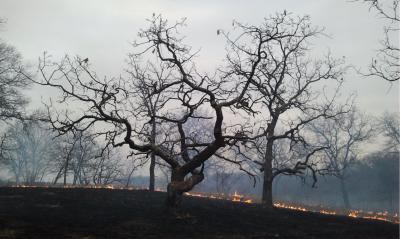
Credit: Susan Barrott, UMinn
Imagine being a scuba diver and leaving your oxygen tank behind you on a dive. Or a mountain climber and abandoning your ropes. Or a skydiver and shedding your parachute. That's essentially what humans are doing as we expand our footprint on the planet without paying adequate attention to impacts on other living things, according to researchers from the University of Minnesota and McGill University. Because we depend on plants and animals for food, shelter, clean air and water and more, anything we do that makes life harder for them eventually comes around to make life harder for us as well.
But, reporting with colleagues from around the world in this week's special biodiversity issue of the scientific journal Nature, the researchers also note that all is not lost, and offer specific strategies for turning that tide before it's too late.
Forest Isbell, of University of Minnesota's College of Biological Sciences, McGill biologist Andrew Gonzalez and coauthors from eight countries on four continents provided an overview of what we know and still need to learn about the impacts of habitat destruction, overhunting, the introduction of nonnative species, and other human activities on biodiversity. In addition, they summarized previous research on how biodiversity loss affects nature and the benefits nature provides — for example, a recent study showing that reduced diversity in tree species in forests is linked to reduced wood production. Synthesizing findings of other studies, they estimated that the value humans derive from biodiversity is 10 times what every country in the world put together spends on conservation today — suggesting that additional investments in protecting species would not only reduce biodiversity loss but provide economic benefit, too.
"Human activities are driving the sixth mass extinction in the history of life on Earth, despite the fact that diversity of life enhances many benefits people reap from nature, such as wood from forests, livestock forage from grasslands, and fish from oceans and streams," said Isbell, who served as lead author the paper. "It would be wise to invest much more in conserving biodiversity."
"Biodiversity plays a big role in the UN Sustainable Development Goals that aim to ensure human wellbeing in the long-term" said Gonzalez. "Attaining the UN SDGs will require action to conserve and restore biodiversity from local to global scales".
###
Linking the influence and dependence of people on biodiversity across scales, doi: 10.1038/nature22899
McGill University: http://www.mcgill.ca
The University of Minnesota College of Biological Sciences: https://cbs.umn.edu/
Media Contact
Cynthia Lee
[email protected]
514-398-6754
@McGillU
http://www.mcgill.ca
############
Story Source: Materials provided by Scienmag





